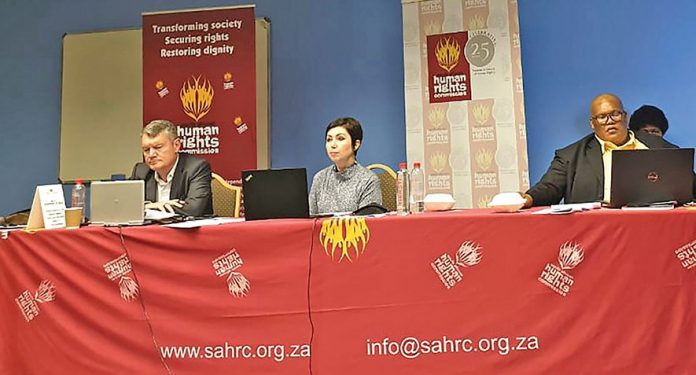The South African Human Rights Commission (SAHRC) has laid bare the role of school governing bodies in violating children’s basic human rights through codes of conduct that do not comply with the constitution.
The commission also exposed the complicity of provincial departments of education in the disregard of pupils’ rights by not developing policies to ensure that school codes of conduct are in line with the Bill of Rights.
The provincial inquiry into the right to basic education and the regulation of school uniforms was held in Gqeberha, Eastern Cape this week, led by a panel comprising provincial commission representatives Dr Eileen Carter and Advocate Loyiso Mpondo and chaired by commissioner for basic education Advocate André Gaum.
The inquiry looked into a variety of ways in which codes of conduct promote discrimination and inequality, from uniforms and hairstyles to freedom of expression pertaining to religious and cultural beliefs.
The inquiry heard representations from academic scholars, the Commission for Gender Equality, LGBTQI activists, teachers unions, the MEC for
education in the province, the office of the premier and independent schools.
“Many schools still have codes of conduct that are discriminatory and exclusionary,” said Gaum, noting that this was despite 27 years of democracy.
He said the commission had called on the national and provincial departments of education to do an audit on schools’ codes of conduct to check compliance with the Bill of Rights. “Nothing much has happened.”
He said the Department of Basic Education (DBE) had “draft national guidelines on school uniforms” that were written in 2006.
The proposal for human rights-oriented codes of conduct was received with mixed reaction.
Brett Mitchell, representing the National Professional Teachers’ Organisation of South Africa in Eastern Cape, said the union preferred the education and training approach to deal with issues relating to discrimination and exclusion, giving examples of different courses that the union offered to better equip its members.
The MEC for education in Eastern Cape, Fundile Gade, submitted that the province was finalising guidelines, including those for uniforms.
When probed about the department’s position on gender-neutral uniforms, hair and the wearing of religious and cultural items, Gade said they still needed extensive consultation with stakeholders.
“You have to comply with human rights; you can’t buy into human rights,” said Gaum. “Resistance or no resistance, the death penalty was abolished. Corporal punishment was abolished in schools.”
The office of the premier, represented by Advocate Rupert Fortune, was called out for not being supportive of the plight of the LGBTQI community by ignoring their petition, which raised some of the issues discussed at the inquiry.
“What we think is a softer issue can be an issue of life or death,” said Mpondo.
Gaum has hinted that it would be appropriate for the SAHRC to issue directives to the DBE, provincial departments of education, as well as institutions such as school governing bodies, to ensure that codes of conduct complied with the Bill of Rights.
Follow @SundayWorldZA on Twitter and @sundayworldza on Instagram, or like our Facebook Page, Sunday World, by clicking here for the latest breaking news in South Africa. To Subscribe to Sunday World, click here.
Sunday World



